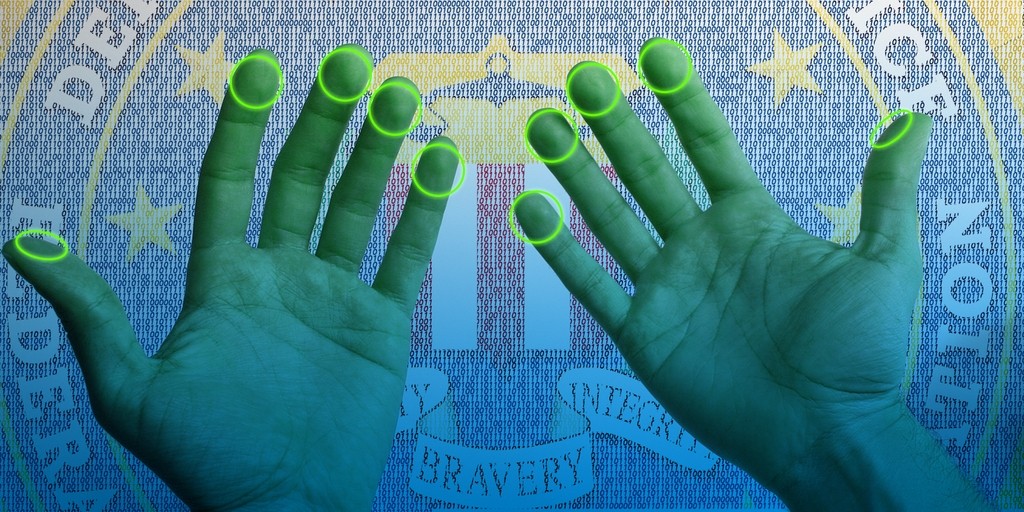The Federal Bureau of Investigation (FBI) is attempting to suppress information about a massive database which contains fingerprints, palm prints, iris, voice, and face scans, as well as other biometric data, of millions of Americans.
In early May the U.S. Department of Justice released a proposal which would exempt the FBI’s biometric database from public disclosure. Specifically, the proposal would exempt the Next Generation Identification (NGI) System from provisions of the federal Privacy Act, which “requires federal agencies to share information about the records they collect with the individual subject of those records, allowing them to verify and correct them if needed.” The proposal is open for public comment until June 6, 2016.
Although the database does contain biometric data on convicted criminals, it also contains information on individuals who were only suspected or temporarily detained under the suspicion of a crime. The system also features data from people fingerprinted for jobs, licenses, military or volunteer service, background checks, security clearances, and other government processes.
Essentially the FBI is arguing that it will prevent individuals from knowing if their information is in the massive database if the release of information would “compromise” a law enforcement investigation. Next Gov first reported on the proposal:
“Letting individuals view their own records, or even the accounting of those records, could compromise criminal investigations or “national security efforts,” potentially revealing a “sensitive investigative technique” or information that could help a subject “avoid detection or apprehension,” the draft posting said.
Another clause requires agencies to keep the records they collect to assure individuals any determination made about them was made fairly. Arguing for an exemption, the FBI posting claimed it is “impossible to know in advance what information is accurate, relevant, timely and complete” for “authorized law enforcement purposes.”
Although the database may contain information about individuals conducting perfectly legal actions and behaviors, the proposal says the FBI should hold the data because “with time, seemingly irrelevant or untimely information may acquire new significance when new details are brought to light.” The FBI claims the information within the database could possibly help with “establishing patterns of activity and providing criminal lead.”
Jeramie Scott, a national security counsel at the Electronic Privacy Information Center, told NextGov that the proposal “would set a worrying precedent in which law enforcement has significant leeway to decide what information to collect without informing the subject.”
Although very little is actually known about the database, the Electronic Frontier Foundation (EFF) and EPIC have been able to uncover that the FBI would like to track every individual as they move from one location to another. In 2013, EPIC obtained a document which showed, “NGI shall return an incorrect candidate a maximum of 20% of the time.”
In 2011, the EFF acknowledged that,
Once the collection of biometrics becomes standardized, it becomes much easier to locate and track someone across all aspects of their life. EFF believes that perfect tracking is inimical to a free society. A society in which everyone’s actions are tracked is not, in principle, free. It may be a livable society, but would not be our society.
In 2014 the EFF received documents from the FBI related to the NGI system. Based on the records, the EFF estimated that the face recognition component of NGI would include as many as 52 million face images by 2015.
If you are an outspoken activist, have ever been detained, or arrested, your biometrics are more than likely contained in this database. If you have ever applied for a driver’s license or state identification card you are likely in this database. Millions of innocent people are having their biometrics scooped up and logged into another database that federal agents will have unrestricted access to. When combined with cellphone surveillance, aerial surveillance, and every other surveillance tool available to the local, state, and federal agencies, a clear picture of a draconian Surveillance State emerges.
Thankfully, there are examples of individuals working to create technology (here, here) that can combat the pervasive eyes and ears of Big Brother. However, until those counter-surveillance tools are widespread in the mainstream we must take principled action against the Surveillance State. Invest in technologies that promote privacy and protection. Use encrypted chats, emails, and video calls. Learn about the myriad of alternative options available to you. Only by taking action and seeking solutions will we find the path towards a more free world that values privacy of the individual.
SHARE THIS ARTICLE...


No comments:
Post a Comment